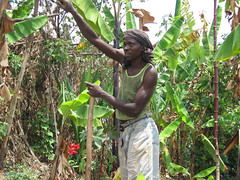Tomorrow leaders from the G20 will gather in London to continue their discussions regarding the world economic crisis.
The countries comprising the G20 account for approximately 90% of world GNP, 80% of world trade, and 2/3 of the world's population, so they pull some serious economic weight. Membership is comprised of the finance ministers and central bank governors of Argentina, Australia, Brazil, Canada, China, France, Germany, India, Indonesia, Italy, Japan, Mexico, Russia, Saudi Arabia, South Africa, South Korea, Turkey, the United Kingdom and the United States of America, and also the European Union who is represented by the rotating Council presidency and the European Central Bank. In addition, the Managing Director of the
International Monetary Fund (IMF) and the President of the
World Bank, plus the chairs of the International Monetary and Financial Committee and Development Committee of the IMF and World Bank, also participate in G-20 meetings on an ex-officio basis.
According to the
G20 website, "the Group of Twenty (G-20) Finance Ministers and Central Bank Governors was established in 1999 to bring together systemically important industrialized and developing economies to discuss key issues in the global economy." The G20 "is an informal forum that promotes open and constructive discussion between industrial and emerging-market countries on key issues related to global economic stability. By contributing to the strengthening of the international financial architecture and providing opportunities for dialogue on national policies, international co-operation, and international financial institutions, the G-20 helps to support growth and development across the globe.
This gathering, of course, presents tremendous opportunity for the rich nations of our world to collaborate on a unified response to the challenges that affect each member nation. It is an opportunity to look not only at the specific challenges facing our nation, but to recognize the role that we play and the responsibility that we share, in making sound choices for all people, not just our own. We cannot only take into consideration what is best for Americans, but must also consider how our mismanagement of the financial system affects millions of people around the world.
Barbara Stocking, chief executive of
Oxfam International, said today, "Rich governments whose policies contributed to the crisis have a responsibility to help those who cannot afford their own bailouts" (read the article
here). The press release from Oxfam actually is entitled, "Bank bailout could end poverty for 50 years – Oxfam tells G20." That's quite a statement and should give us pause. Rich countries have committed $8.42 trillion to bail out troubled banks. That is the equivalent of $1,250 for every man, woman, and child on the planet. According to Oxfam, the annual cost of lifting the 1.4 billion people living on less than $1.25 per day is $173 billion. Something to consider as we spend so much to try to preserve our comfortable way of life here in the rich world.
One of the best places to follow teh G20 from a development perspective, particularly from teh perspective of those seekign to end global poverty is at the
ONE website. There is lots of great information, their policy recommendations, and daily updates.
 Image by jon gos via Flickr
Image by jon gos via Flickr
![Reblog this post [with Zemanta]](http://img.zemanta.com/reblog_e.png?x-id=35a640ac-5d37-4818-a74d-9f9e75dd5a45)
![Reblog this post [with Zemanta]](http://img.zemanta.com/reblog_e.png?x-id=6683d19a-76fa-4400-b1e6-8d667afc8e33)



